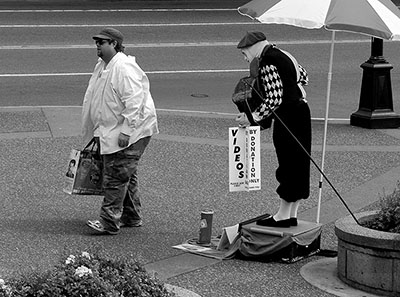| Serf in USA | ||
| To continue to prosper a society needs government, yet such is legitimate only if it is of the people not upon them. | ||
| Site content and all photographic images are Copyight 2007 Lebovitz |
Photographic images provided byEye2Eye GalleryLinks in Progress
|
COMMENTS- - 2010 |
|
November,2010: Full Cavity Search Anyone?Let me see if I understand this. We abhor using preventative extreme measures on terrorists. However, we should accept intrusive preventative means on our citizens. A little social arithmetic is in order here. Is water boarding a hundred times more intrusive than a grope or naked scan? Worse than that? OK; say it is a thousand times more brutal to the psyche. Over a year’s time 800-850 million passengers travel by air. On a relative intrusion scale, that would yield the same net total level of personal intrusion as about 800-850 thousand water boardings. Too extreme? OK, say water boarding is a hundred thousand times more intrusive than the threat of having your private sexual areas rubbed in public. This would be on par with 8000 to 8500 water boardings, which still puts the terrorists, as a group, relatively less perturbed overall. Silly analysis? No more than evaluating the net social good of seat belt laws, banning cigarettes, punishment of drunk driving or fluoridation. But heavens, we are instructed, the groping, peering and low level irradiation are such minor intrusions. Perhaps. But is anyone ready to specify that threshold level for the relevance of personal insult? Or that when below that presumed threshold personal affronts or insults are non-affective? If so, then there is e great crowd of therapists and penal scholars that should be thrown out of work. It is far more likely that total stress is exactly the accumulation of many small, each individually arguably innocuous, events. Exhortations to “Grow up. Take it like a man,” are exactly what the powerful say to the underlings. Metal fatigues and fractures from accumulated stress. Why not a population? Being realistic as to from whence comes our current high level of threat, would not thoroughly vetting each passenger, while perhaps just as intrusive as the current procedures, be less primitive for the innocents and yield more effective protection against radical Islam? Indeed, the terrorists are winning and you can look to those, who after decades of exposure to the threat, have determined that being politically correct and groping grandma are the best next level of security enhancement. Having to partially disrobe and be herded by grim faced guards in reaction to every new terror scheme is bad enough. After the ‘thoughtful and necessary” responses to shoe and underwear bombs, don’t dare let yourself think about the system’s reaction to the next easily imagined tricks, such as an I-phone with a knife’s edge, a baby’s rattle full of mace or a poison gas canister up the rectum. “FCS ‘em!” |
 |
|
July, 2010: Politics as Usual or Grosse Lüge?Republicans are no more to blame for America’s decline than the Democrats. Both parties cater to the whims and whiles of the financial lobby. Each is a fiscal reprobate. Both parties’ administrations, from Carter forward, were instrumental in putting us in a financial morass, from which we will climb out of only after many rueful glances backward, and for pulling us into the quicksand of Afghanistan, from which many will never arise. But we must distinguish between political ideology, which aims to project an agenda, and crass political posturing, which aims to restructure facts. Texas Representative Barton’s recent feckless apology to British Petroleum is but one example. His self-serving posturing exemplifies a right wing grown coarse and shrill, seeking salvation through ever more extreme outbursts. Now comes the equally disingenuous executive commentary of the RNC Chair, Michael Steele. To offer that the admittedly misconceived longest war in Afghanistan is “Obama’s War” represents neither ignorance nor disagreement but rather, and far more disturbing, the propagandist’s technique of the “Big Lie.” Such may be tone of American politics for another generation, God help us. An apology may indeed be in order here, but only to all who serve. When exemplary extremes, such as these, arise at the leadership level, extremes that have the aim not to lead but to mislead, we are in serious trouble. When out of power, a political party will, indeed should, find much to complain about. Our democracy requires vibrant political opposition. However, the Republican Party would do well to rid itself of pea brained, reflexive vuvuzelas that haunt its media image and confound its effectiveness. Somehow, I doubt that it will. |
||
March 14, 2010: Disgust, Disgusting, Disgusted -or- Foggy Days in Foggy BottomWhile Republican by instinct, I voted for Obama. The promised rational, reality based government was to be a most welcome change after the Cheny/Rove administration. Those latter theocratic wizards used the pressure of external events to move us faster and farther along the road to authoritarianism than ever I would have imagined possible. At this end of the “noughties” we have a brief window to reverse course, to counter a trend that parallels McCarthyism and the dark trials of zealous statists. Should we suffer yet one more crippling blow to our international standing and/or finances, the trend may become irreversible. History provides many unhappy examples of powerful states so weakened from within that they become ripe for collapse. Yes, I voted Democratic but now it simply must be said: Our would be, periodically responsive (in November) solons are acting like pigs at a trough. With the arrival of a new administration did we get the government so earnestly promised, and so desperately needed? Unfortunately not. Promise and hope have evaporated in the hot wind of palace politics and the cause celebre that is the health care bill. The administration’s position could not be more clear: “Give them what we want them to want and to h... with what they claim they want. We will win over their hearts and minds later.” From such eerily historical cynicisms, here as well as abroad, we will once again suffer economic and political distress. Still, there are notable winners. These are the entrenched ideologues in our sorry mess that is congress. Senators and Representatives alike, sensing the aroma of the lavish legislative buffet that is the unconscionably obscure and pathetically argued “bill,” pimp their votes. (And what, we may well ask, does that make their constituents?) They juggle for transient PR advantage and root out the best paths to corporate sponsorship. As reality fails them they move, just as in the recent heady days of creatively obscure financial derivatives (likely yet to ruin us all), from selling the fact through selling the wish to selling the myth. “Facts are stubborn things.” Reality, unless you are mentally disturbed, will force itself upon you. The future, on the other hand, is a ready field for hyperbole, devious analysis and simple minded illogic without limitations. As abhorrent as was the prospect of one party rule at the onset of the current administration, what we have now is worse. Carefully crafted procedural manipulation replaces absolute majority control. Self-serving deals of congressman and of staff, faulty analysis, practiced posturing before the cameras take us deeper into bloated bureaucracy, punishing taxes, constricted freedom of choice and, in the end, a diminished yet stubbornly over priced system of health care. It is old fashioned opportunism, greed and obstructionism - political individualism at its finest! Who will be the real winners? Make your list, but don’t include We The People. |
||
January 26, 2010: Consumptive ConsumptionDemand, specifically individual consumer demand, is regulated by the corporation. This is the often denied but demonstrably valid “revised sequence” of Galbraith, the counterpart to the Econ 101 fiction of the control of production by demand. Its economic sum, aggregate demand, with industrialization has come to be regulated by the state. For this to be effective, the state must be a dominant consumer itself. The state, in other words, can exert effective economic force only through expenditures that constitute a significant perhaps dominant fraction of the overall economy. Such planned expenditures, derived from taxation and which for the larger part of the last century have been focused on the “military industrial complex” and thereby perhaps unfortunate on moral grounds, have had the welcome benefit of invigorating industrial and technological sectors. One cannot ignore the resultant general benefits. Witness the new technologies, the new industries, the major improvements in goods and services by which we have risen to be the world’s dominant economic power. However, we are aging in a world of younger, maturing economies. The beginning of a new century marks an unfortunate turning point. Along with displacement of our industrial base we are seeing reduction or outright cancellation of scientific and technological programs, largely on budgetary grounds. Increasingly our consumption is of the virtual, the peripheral and the inane, consumer sectors that have the otherwise virtuous characteristic of dealing with goods that are infinitely reproducible at vanishingly small per unit cost. The third trend is the increasing structural concern with basic needs. No one would deny that the last mentioned is virtuous and perhaps even desirable. Yet the regression to an earlier, preindustrial stage of economic function must be noted. It is a regression to a society which focuses more on current consumption and maintenance rather than investment and intellectual progress. The critical issue with this change in allocation is not intention as much as it is finite resources. In our maturity (dare I say senectitude?) we, as a nation, are rapidly moving towards the replacement of the expenditure of public funds, which expenditure has an undeniable investment component, to expenditure in the form of maintenance. Health and welfare entitlements are but one component of this but are notable in view of their Ponzi like growth. Again, as necessary and noble as this may be and as certain as is the continuing role of the government as overall manager of aggregate demand, such an economic allocation will not yield the forward progress to which we have become accustomed. Can intent trump economics? There are practical limits to the extent to which government revenue can be extracted from the constituents of an economy and still consider that a free economy. But this is a matter for social control. However, in addition to fiscal limits, there are strategic limits. This is a matter for social policy. It is critical that we now carefully consider the social/cultural wisdom of focusing our economy so massively on the extension, the broadening and elevation of perceived elemental needs at the expense of competitive economic advantage. Alone at the pinnacle of economic power we could do both. No longer. |
 |
|
January 15, 2010: Why Now?The question has to be asked: Why would we, middle class consumers, want to consume less and thereby undercut the very economy upon most of our livelihood depends? The domestic economy is 2/3 consumer spending so the latter half of the issue is affirmed. But why choose to reduce our personal consumption and thereby undercut the rationale for effort and initiative? After all, the major negatives of a socialist world are the applied disincentives for such exertions.Firstly, is such a cutback feasible? There is a core of consumption that we would not and should not defer; leave masochism to the fanatics. At the other end of the spectrum there is consumption that yields great pleasure, that justifies the time spent performing tasks for others. It would be hard to deny access to such consumption, for thereby there would be little need for toil beyond that required for satisfaction of elemental needs. Yet there are decisions that can be made, consumption that can be eliminated or deferred. The trick is to separate that which is truly valuable from the vacuous, to discern what is meaningful to one’s personal life style. In the middle is foolish, the inane, the reactive consumption promoted by the practical psychologies and exhaustive manipulation that is modern marketing. Each of us is guilty of succumbing to such pressures and one should not feel sheepish in the admission. After all, mass consumption has been the economic engine of “growth” since the creation of the Federal Reserve, the dominance of fiat money and perhaps even the capitalistic system itself. It is instructive to note that there was a time when “conspicuous consumption” was closely regulated, limited, in fact, to those of a particular upper social class or political class. No longer an assigned or inherited privilege, consumption is our individual choice. Unfortunately, however, it has more recently taken on also the character of an obligation, as was often in evidence in post depression (D One, that is) advertizing. “Buy that new electric ice chest now and put your neighbors back to work.” The problem is that this heavy demand for directed consumption has placed the bulk of consumers in perpetual service to he resultant debt. Too few take the time to recognize the distinction between working to service debt and working in service to debt. The former is a welcomed expression of upward movement of informed choices. It implies a willingness to expend effort so as to generate the means to support those choices. The latter is a descent of imposition, a reduction of true self-management to the point of becoming a virtual serf. The term “serf” is apt since being required to pass on a large fraction of productive capacity, after conversion into money, to others has that historical resonance. The progression away from true economic freedom has already started and, like history itself, its pace is glacial. It is not remarkable that general recognition of the trend may not occur until it has become too entrenched to reverse. A marked reduction in consumption of the trivial and peripheral , the exertion of personal control over imposed impersonal habits is not only possible, it is now critical. Lacking a physical asset basis, money and credit growth have proceeded unchecked except for common consent and cooperation, neither of which is irrevocable. The argument that fiat money has an asset base in the productive capacity of a society is suitably optimistic, but is circular and unimpressive. In truth, if such has a basis at all it is in hopes and expectations and thus subject to the “....Popular Delusions.... of Crowds” ( ref: Charles Mackay) The vast middle class, those with discretionary income, have become the engine of growth in a monetized economy that demands growth and for this, debt. To reverse this generational trend, to escape being a debt serf will take personal strength, perhaps sacrifice. With the operational recognition that forbearance of the trivial in the short term will yield greater personal freedom and choice in the long term we should be able to mobilize our will and decisions to the effort. |
 |
|
January 2, 2010: The Power of the PurseThe proposed imposition, by Great Britain and France, of a 50% windfall tax on bankers’ bonuses has received a cool response in the US. Not surprising. One wouldn’t expect Treasury chief Geithner, a scion of banking and Wall Street (to which he most certainly will return) to cater to “creeping socialism.” However, perhaps it needs to be explained once more how using tax dollars to sustain the financial wizards is not itself “corporate socialism. “ I have no great problem with federal support of the financial sector. The bailout money enabled them to weather the storm, to our apparent general benefit. Failure to act would have left us wondering why we have a government at all. It was a huge gift to that sector, one deserving of thanks and beneficial repayment in kind, not the hubris of obscene bonuses derived from the taxpayer lifeline. Now they want to pay back the “bridge” loans, to claim “no harm, no foul” and, in addition to handsomely rewarding themselves for being imprudent pigs with great connections, to be rid of governmental restrictions and return to bad business as usual. Foreclosures, job losses, bankruptcies, soaring credit card rates and tight loan policies suggest that the middle class is receiving little in the way of comparable direct assistance. Recovery is going to be slow, lengthy, laborious. A direct bailout for the denizens of main street might have been socialistic and unseemly. But it may have been of quicker, surer benefit and incurred less sovereign debt. The asymmetry of policy is crucial, as is our inability to gain sufficient traction in congress to do anything about it. All financial ears and eyes now await, as for Godot, the “return of the consumer.” If the current crisis has anything in the way of a good side, it is in this practical demonstration that the middle class does indeed have vast power. They are the primary discretionary consumers, the demand engine underlying development, production, distribution and the rest. Economic recovery lies on their shoulders as does, unfortunately, their personal and governmental debt load. To spend, to incur further personal debt and thereby reflate the financial sector is the path to economic recovery, we are told. But whose? In consumption or the lack thereof, lies considerable power to turn policy and the economy back to in service to the middle class. This country has more than once from unlikely sources seen the expression of economic choice alter policy. As the kindly mule driver explained as he thumped his poor animal on the head with a plank, first you have to get their attention. We need to get the attention of the bureaucracy via a new take on our roles as consumers, viz., by reducing discretionary consumption in favor of growing assets and decreasing debt. It is possible; there does not have to be a consumers’ “general strike.” Electing for a short time to buy only that which is truly beneficial and/or necessary would constitute a sharp departure from long cultivated habits but is not unthinkable. It may, in fact, be the only real power we have in this age of corporate politics and extremist ideologues. Think, as we were enjoined during other times of national crisis: Is that purchase really necessary? Is our personal well being, comfort, or pleasure really well served by that expenditure? A few months of that would certainly be noticed. I am greatly aware of personal weaknesses and therefore have every expectation that such a shift in consumption will be glacial, if ever. But economic pressure, like political, is best exerted at the margin. In the current mess the government is demonstrably incapable of leading. One party rule isn’t doing it and neither will recalcitrant gridlock. Death and Taxes? These are not the worst of it. We are facing an unprecedented regression to an age wherein the vast majority of individuals had little discretionary power of the purse. Hopefully we will not retrace the path back to a time when most productive energy was devoted to basic needs, to the era of the company store. But we must recognize that the argument that our personal economic well being depends on our increasing service to, rather than of, debt is false. We do not want to become ascetics nor go to the place the Chinese are striving so hard to leave. We must, however, direct that discretionary control which remains in our hands towards energizing political power, else we soon will be left very little of both. |
 |
|
|
||